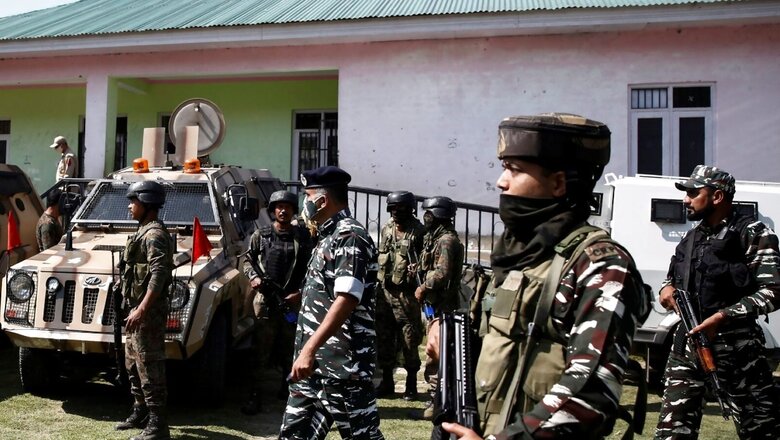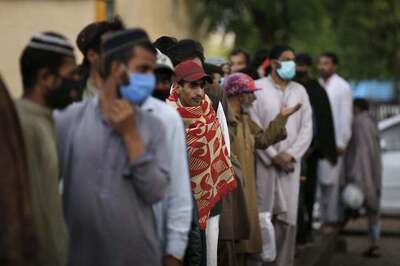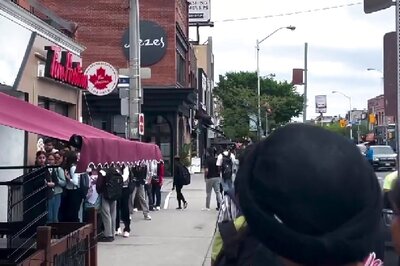Better Tech, Weapons, Forensic Facilities: Modi Govt’s Rs 26,275-cr Push to Modernise Police Forces

views
The Prime Minister Narendra Modi-led central government has approved a massive budget of Rs 26,275 crore from 2021-22 to 2025-26 for its umbrella scheme, Modernisation of Police Forces (MPF), as part of the initiative by Union home minister Amit Shah to improve the functioning of police forces across states and union territories.
PUSH FOR POLICE IN J&K, MAOIST-AFFECTED AREAS
A major chunk of the budget has been given for the modernisation required to deal with Maoists and terrorism. “A central outlay of Rs 18,839 crore has been earmarked for security-related expenditure for the Union Territories of Jammu & Kashmir, insurgency-affected NorthEastern States and Left Wing-Extremism (LWE) affected areas,” the ministry of home affairs (MHA) said in a press statement, while giving details related to development.
“With the implementation of the ‘National Policy and Action Plan’ to combat the LWE, the LWE violence incidents have come down drastically. To further pursue this accomplishment, six LWE-related schemes with a central outlay of Rs 8,689 crore have been approved. These schemes include Special Central Assistance (SCA) to Most LWE Affected Districts & Districts of Concern to consolidate the gains,” MHA said.
“For raising of India Reserve Battalions/Specialised India Reserve Battalions, a central outlay of Rs 350 crore has been approved,” MHA said.
Various forces, police and veterans feel it will help the forces deal with the technology terrorists and Maoists use.
“It is certainly a good step. The government is constantly focusing on giving a boost to security forces, be it in terms of weapons, strength or modernisation of police. Although it is a long project which will take time to show its effect, it will surely will enhance the capability and efficiency of all police forces, especially those deployed in Maoist-affected areas and Jammu and Kashmir,” MP Nathanael, former inspector general, Central Reserve Police Force (CRPF), who has served in Maoist-affected areas as well as J&K told News18.
Similarly, a senior police officer from the Jammu and Kashmir force said this budget would help the police and forces uproot terrorism. “The government is not only keen to help weed out terrorism in Kashmir, but is also giving the assets required to deal with it. The next four years of the scheme will be crucial,” he said.
DRUG-FREE INDIA MISSION
For narcotics control, the MHA said a provision has been made under the scheme to ensure internal security, law and order, adoption of modern technology by police, assistance to states and strengthening of the criminal justice system by developing a robust forensic set-up in the country.
“The central sector scheme of ‘Assistance to States & Union Territories for Narcotics Control with outlay of Rs 50 crore has been continued,” MHA said.
The Narcotics Control Bureau (NCB) has a plan to counter technology-led drug smuggling in India. It has received clearance to increase its strength by 1,800 and set up a cyber-wing to help experts track and crack down on smuggling activities through the Darknet and cryptocurrencies this year.
The anti-drug nodel agency of India will have a cyber-wing, which will be headed by a deputy director general of police-level officer and will only work on drug-related crimes fuelled by the internet, especially the Darknet. The wing will have close coordination with intelligence agencies and have almost a dozen officers.
The state governments have already been asked to get training from central institutes.
FORENSIC AND SCIENTIFIC INVESTIGATION
The MHA is now focusing on shifting from the traditional approach to scientific investigation. The ministry has allocated more than Rs 2,000 crore to boost investigation based on forensic science.
“To develop operationally independent high quality forensic sciences facilities in States/Union Territories for aiding scientific and timely investigation through modernisation of resources, a central scheme for Modernisation of Forensic Capacities with outlay of Rs 2,080.50 crore has been approved,” MHA said.
The MHA has informed the Parliamentary Committee of Home Affairs that a specialised centre of Sardar Vallabhbhai Patel National Police Academy (SVPNPA), namely National Digital Crime Resource & Training Centre (NDCRTC), has been set up in 2015, which has conducted over 290 physical courses and trained more than 8,800 officers from more than 24 organisations in the past five years.
The committee report stated: “…the pysche of criminal minds has undergone a sea change, with the evolution of modern technology. Cases of newer ways of using technology for committing crimes particularly, financial frauds are rising day by day. The committee, therefore, recommends that the training institutions like SVPNPA and NEPA may take up with states’ training academies to conduct training/sensitisation programmes on artificial intelligence, robotics, drone technology, forensic and ballistic sciences, so that police personnel become adept in the detection, investigation and prevention of such crimes in a professional way.”
ALSO READ | Amit Shah Pitches for ‘Just Action’ by Police, Says They Get Defamed for ‘no Action’ or ‘extreme Action’
MODERNISATION OF STATE POLICE
To empower states, the centre has allocated a budget for various initiatives which will be part of modernisation.
“The scheme for modernisation of state police forces has a central outlay of Rs 4,846 crore. The central sector scheme of ‘Assistance to States & Union Territories for Narcotics Control’ with an outlay of Rs 50 crore has been continued,” MHA said.
The budget will help states get latest modern equipment for their police forces. States have already started purchasing latest weapons to deal with local crime as well as terrorism.
The MHA has also told the Parliamentary Committee that police training institutes at central level impart training to senior police officers of the centre and states. However, the state-level training institutes have an objective of providing training to lower and mid-level officers such as deputy superintendent of police, SHO, SI, ASI, constables, etc. “The committee was informed by the state governments that their training system is aimed to develop professional competencies to inculcate knowledge, desired skills, appropriate attitude and values to achieve highest standards of service orientation, professionalism, performance and accountability,” the report said.
The MHA has also briefed that in addition to improving their professional competence, training of police personnel is also aimed at “developing their overall personality and nurturing human values which helps in meeting changing expectations of the public”.
“This is achieved by integrating courses such as human rights and policing, gender sensitisation, etc into the curricula. The trainees are made aware of current issues of state/national/international importance which help them understand the socio-cultural and political equations of the society, thus ensuring effective service delivery to people,” the parliamentary report said.
Read all the Latest India News here


















Comments
0 comment